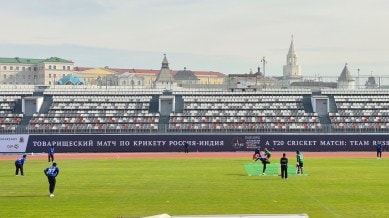Stay updated with the latest - Click here to follow us on Instagram
From the Volga banks, a Russian republic calls India: Boost trade & ties
Consulate opening in Kazan, Telangana makes a strong case for investment

In Kazan, where the Volga meets the Kama south of the city, two teams met on the field for a T20 outing on a sunny morning this week. Vinay Kumar, India’s envoy to Moscow, was there to greet Team Russia and Team India, their playing 11s largely students, watched by most with little or no knowledge of cricket.
It was soft diplomacy at play, India returning to the city where, a year ago, Prime Minister Narendra Modi and President Xi Jinping met on the boundaries of the BRICS summit, leading their sides to revive ties frozen due to the military standoff on the icy plains of Ladakh.
monthly limit of free stories.
with an Express account.
Now, “in a matter of weeks, not months”, as Kumar put it, India will open a consulate in Kazan, the capital of Russia’s east European Republic of Tatarstan whose growth and wealth have been fuelled by its oil and petrochemical industries.
Over two days this week, amid the strain in ties between New Delhi and Washington over the Trump administration’s imposition of tariffs including a penalty on India’s purchase of Russian oil, Kazan hosted another summit — the first Tatarstan Initiative Mutual Efficiency (TIME): Russia-India Business Forum. This has been framed as part of a plan to reach out directly to regions in India — “moving from cooperation between the capitals of our countries to cooperation between the regions”.
Rustam Minnikhanov, the Rais and the Head of Tatarstan, and Prime Minister Aleksey Pesoshin are steering the republic’s efforts to expand cooperation with India, inviting investments, scouting for opportunities and preparing a roadmap for collaboration, sector by sector.
Hosting Indian delegates at a breakfast meeting, Minnikhanov sought greater interaction, especially in the fields of pharmaceuticals and information technology. And in the sessions that followed, speaker after speaker, pointing to the forum theme TIME, said the time to act is now.
Until now known for its oil exports and large community of Indian students pursuing medical degrees, Tatarstan is promoting itself as a gateway for Indian businesses into the larger Russian market.
Taliya Minullina, who heads the Tatarstan Investment Development Agency, said, “We have created the Russia-India platform as a business forum. This platform is meant to implement the tasks set by President Putin and Prime Minister Modi. They agreed that by 2030, the trade turnover should reach $100 billion. Regions and provinces should also participate in this. A passive position will not lead to success. We should start an open dialogue, learn and understand each other, and move.”
In 2024, trade between India and Tatarstan was $359.4 million, with India’s exports at just $69.5 million and imports at $289.9 million.
Tatarstan’s exports range from oil and petroleum products to fertilisers, fats and oils to agro goods. Indian exports include electrical machinery and rubber products.
Perhaps the strongest pitch during the meetings was made by Telangana, India’s youngest state.
M Dana Kishore, Principal Secretary in the state’s Department of Labour Employment Training and Factories, while inviting investment from Tatarstan, spoke of Telangana’s rise as an economic powerhouse, the maker of vaccines, its strides in sectors such as pharmaceuticals, information technology, engineering and the potential of the state’s skilled workforce.
Like others, Dana Kishore called for the need to have Russian language training centres for workforce mobility in a labour market that promises jobs and careers.
Highlighting Tatarstan’s investment climate, its relatively low land and rental prices and tax benefits, Minullina said, “Information technology is one of the basic industries where we could work together.” She also flagged pharmaceuticals, medicine, culture and cinema as the other fields for cooperation.
She said there was agreement that businesses would be advised on the Indian market, and in India on the Russian market — most delegates said there was a need for the people of the two countries to connect better and discover each other’s strengths for mutual benefit.
Agra Mayor Hemlata Diwakar, who highlighted the Taj city’s achievements including its footwear industry, also signed a memorandum on sister-city relations with the Tatarstan district of Spassky, famed for its White Mosque in Bolgar.
The Ministry of Ayush, too, was there, showcasing India’s traditional medicine at an exhibition. Secretary Vaidya Rajesh Kotecha highlighted the growing collaborations in health and wellness, and the Ministry underlined the country’s “commitment to promoting evidence-based traditional medicine, strengthening bilateral cooperation, and fostering a global exchange of knowledge in holistic healthcare”.
Early days, but this outreach, a delegate said, could soar. Like the Kazan helicopters, the backbone of the IAF’s transport fleet.
(This reporter is in Kazan at the invitation of the Republican Agency for Press and Mass Communications ‘Tatmedia’ and TV BRICS International Media Network)